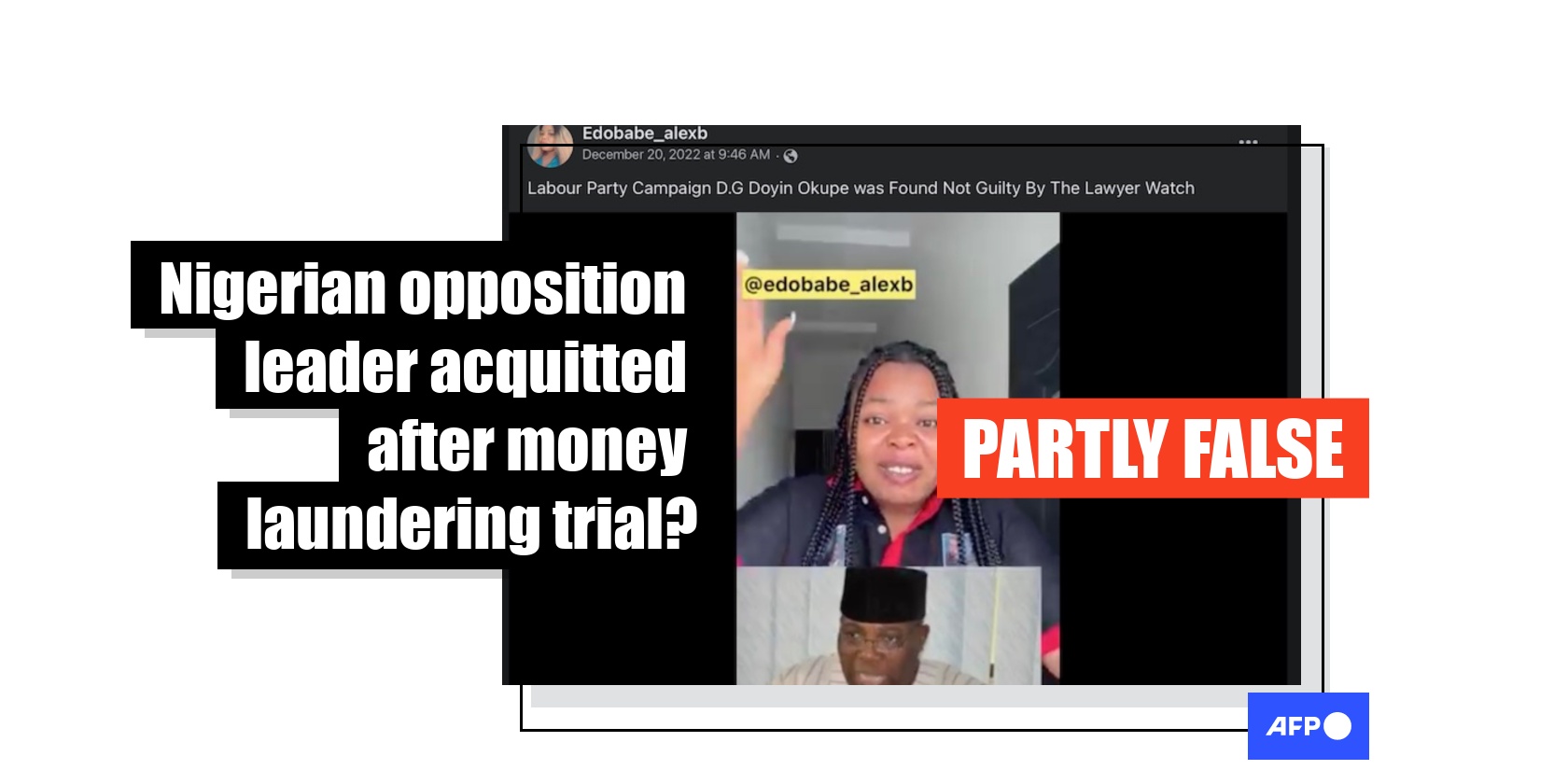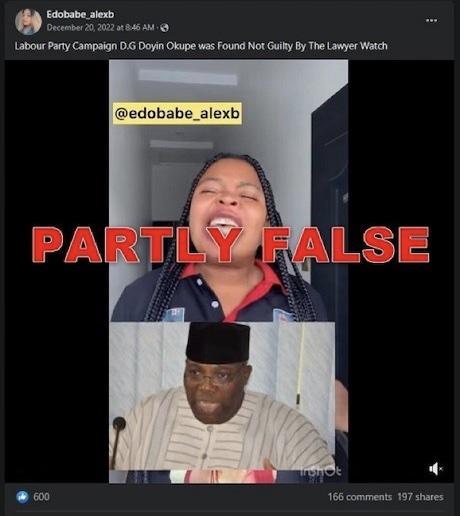
Nigerian court cleared opposition politician of some counts of financial misconduct, but not all
- This article is more than three years old.
- Published on January 6, 2023 at 18:05
- 3 min read
- By Tonye BAKARE, AFP Nigeria
“Labour Party Campaign D.G Doyin Okupe was Found Not Guilty,” reads the post published with a video on December 20, 2022.

The post features a 4-minute video showing Okupe’s picture and a female narrator who claims that the “lawyer that judged the case said the man was not found guilty.”
The video cuts to a clip of Okupe’s lawyer, Tolu Babaleye, at the 60-second mark saying: “... the judgement is very fair” before describing Okupe as a “victim of an honest mistake.”
The Facebook account that shared the post has 170,000 followers and publishes content in support of Labour Party presidential candidate Peter Obi.
Okupe was arraigned by Nigeria’s Economic and Financial Crimes Commission (EFCC) in 2018 on 59 counts of alleged money laundering and criminal diversion of 702 million naira (about $1.6 million).
The commission alleged Okupe collected the funds from the Office of the National Security Adviser between July 2012 and May 2015 when he was former president Goodluck Jonathan’s spokesperson and a member of the PDP.
He later defected to the Labour Party where he considered a bid to stand as a presidential candidate. After dropping the plan, he rallied behind the party’s eventual flagbearer Obi.
Okupe was named the director-general of the party’s presidential campaign committee on October 12, 2022. Weeks later, a state chapter of the party accused him of diverting campaign funds for private use and expelled him.
However, the party’s national leadership overturned his expulsion.
Okupe was less fortunate in court, escaping some of the charges levelled against him by the EFCC, but not all of them. The claim, therefore, is partly false.
Guilty of 26 charges
EFCC spokesman Wilson Uwujaren said in an emailed statement to AFP Fact Check that Okupe was “discharged on counts one to 33”. He was, however, found guilty of counts 34 to 59 by a federal high court in Abuja, Nigeria’s capital, after a trial that lasted four years. He had pleaded not guilty to all the charges.
Okupe was sentenced to two years imprisonment for each guilty count, to run concurrently, with an option of a 500,000 naira fine for each charge.
“The trial court held that the Economic and Financial Crimes Commission, EFCC, successfully established its case against Okupe, that evidence before it established that the defendant had in the discharge of his official duties, accepted cash payments that were above the statutory threshold, without recourse to a financial institution,” Uwujaren told AFP Fact Check.
Section 11 (1) of the Money Laundering (Prevention and Prohibition) Act makes it mandatory for an individual to report the receipt of cash amounts over five million naira to the Special Control Unit Against Money Laundering in writing.
Okupe’s lawyer Tolu Babaleye also told journalists that he was found guilty on 26 counts. He explained that the court gave his client until 4:30 pm local time on December 19, 2022, to pay the fine or be jailed. Okupe came up with the money by the deadline. He resigned from the Labour Party’s presidential campaign council days later.
Conviction?
Although the EFCC and Okupe’s lawyers agreed that he was given a two-year sentence, they disagreed on whether there was an actual conviction.
Babaleye argued that while Okupe was found guilty of 26 charges relating to his failure to report the collection of more than five million naira to the proper authorities, his client was not actually "convicted" because he was cleared of the rest of the charges relating to money laundering and corruption.
EFCC lawyer Ahudu Ibrahim insisted Okupe “was convicted.”
In Nigeria, a former convict is not allowed to contest an election “within a period of 10 years before the date of the election,” if the offence involves “dishonesty” or “contravention of the Code of Conduct”.
Lagos-based criminal lawyer Femi Oluwole told AFP Fact Check that anyone found guilty of an offence and given a jail term is convicted by law, even if the person pays a fine to avoid being sent to jail.
“According to the Nigerian law as of today, that person is an ex-convict,” Oluwole said, referring to Okupe.
Copyright © AFP 2017-2026. Any commercial use of this content requires a subscription. Click here to find out more.
Is there content that you would like AFP to fact-check? Get in touch.
Contact us
